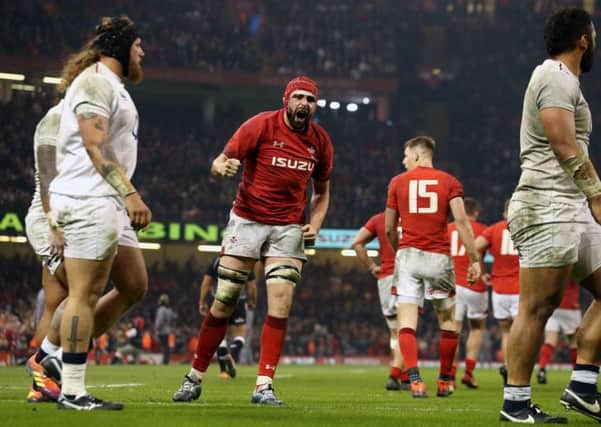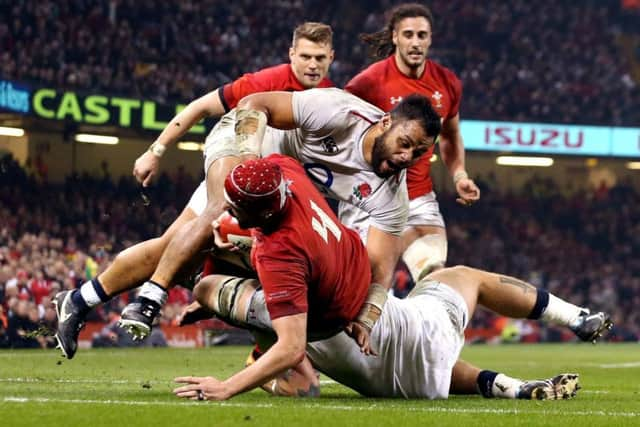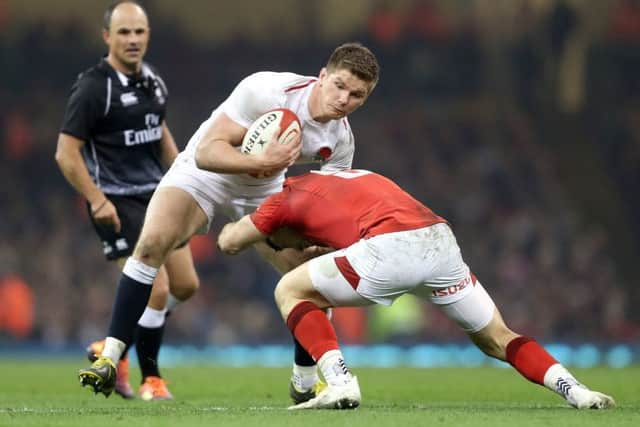Big Match Verdict – Passion and desire sees Wales cut down wilting Red Rose of England


It is a truncated version of the opening gambit of the WRU’s strategy for Welsh rugby.
Saturday night was one of those wild occasions when you truly appreciate the sentiment of it all, a reminder of just how much rugby means to the Welsh public.
Advertisement
Hide AdAdvertisement
Hide AdMany of those who have been attending the Cardiff citadel for years say the atmosphere has never been as loud or as impassioned as it was when Warren Gatland’s side roared back to beat England at the death in this pulsating Six Nations fixture.
The place erupted as Cory Hill battled his way over the line to give the hosts the lead for the first time as late as the 68th minute.
By the time Worcester winger Josh Adams completed the job, with a brilliant take of Dan Biggar’s kick two minutes before the end, it was fortunate the stadium roof was not closed.
It would have surely perished amid the sheer noise otherwise. Or at least had a good wash as what looked like gallons of beer soared into the air.
Advertisement
Hide AdAdvertisement
Hide AdThis performance was certainly a fitting way to break a 109-year record, Gatland’s team becoming the first Welsh side to ever win 12 successive Test matches.


But England, for all they will still be pained this morning at losing the chance of another Grand Slam, can take plenty of positives from the part they played in a fiercely competitive contest.
They executed their gameplan to perfection in earlier wins over champions Ireland and against France. Here, they fought magnificently once more and looked ready to march on again.
However, they were marginally off at crucial times and, quite clearly, there is no margin for error in games of such magnitude.
Advertisement
Hide AdAdvertisement
Hide AdOwen Farrell, for example, lost his way with his usually metronomic right boot, miscuing one kick to deny England a try-scoring chance just before the break when leading 10-3.


When he sailed another into touch in the middle of Wales’ second-half resurgence, you sensed things could be set to go awry.
Still, the character of this England side cannot be questioned, illustrated earlier when they defended their own line for 34 phases until finally succumbing as Hill found a rare inch of space.
Only Wales can now win the Slam but England – with home games against Italy and Scotland remaining – will know they still have a slim hope of taking the championship.
Advertisement
Hide AdAdvertisement
Hide AdWales, for whom British Lions full-back Liam Williams was world-class, must go to Edinburgh next and they are still yet to host reigning champions Ireland.
Where they prospered on Saturday was in the aerial game. England had been garlanded for their dominance in this area in Dublin and against Les Bleus but here Wales took it to another level and starved Eddie Jones’s side of one of their main supply lines.
Asked how hard it was to keep their composure as the atmosphere ratcheted up in the second period, England No8 Billy Vunipola said: “The biggest thing was them trying to take our mind off the game. You saw in the second half there was a lot more niggle and we bought into that because we had a seven-point buffer.
“That’s where they grew and every time the game started to speed up one of their players would go down. The disappointing thing for us is we didn’t fire a shot second half. We didn’t deal with it the way we wanted to.”
Advertisement
Hide AdAdvertisement
Hide AdEngland had scored the only try of the first period via Tom Curry, the Sale Sharks openside who, at just 20 years-old, excelled with the tireless Courtney Lawes.
Farrell converted the 27th-minute score having earlier slotted a penalty. Many of the talking points though, centred on Kyle Sinckler. Beforehand, Gatland said the England tighthead was a “timebomb” waiting to go off.
He was duly replaced in the 58th minute having come close to imploding, conceding two penalties in quick succession.
First, the British Lion blocked Gareth Anscombe and then grabbed Wales captain Alun Wyn Jones around the neck in a maul, the latter leading to Anscombe’s third penalty making it 10-9.
Advertisement
Hide AdAdvertisement
Hide AdSinckler, otherwise impressive, had also conceded the first with a no-arms tackle but Jones maintained he was only replaced – amid a chorus of Welsh boos – because he was tiring.
Ironing out the disciplanary issues will be key for both player and country moving forwards.
Wales: L Williams; North, J Davies, Parkes (Watkin 78), Adams; Anscombe (Biggar 61), G Davies; Evans (Dee 61), Owens (Dee 77), Francis (Smith 61), Hill (Beard 71), Jones, Navidi, Tipuric, Moriarty (Wainwright 77). England: Daly; Nowell, Slade, Tuilagi, May (Cokanasiga 70); Farrell, Youngs; Moon (Cowie-Dickie 77), George, Sinckler (H Williams 58), Lawes (Shields 77), Kruis (Launchbury 64), Wilson, Curry, Vunipola. Referee: Jaco Peyper (South Africa).